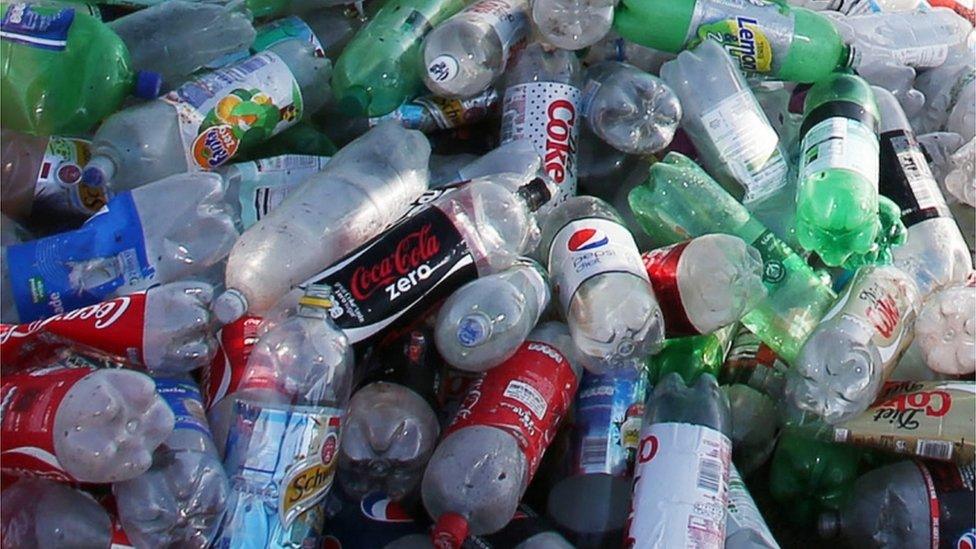Unlawful trade barrier warning over bottle return scheme
- Published

The Loch Lomond brewery has been critical of the bottle deposit scheme
A leading lawyer has claimed that Scotland's bottle deposit return scheme could create an unlawful trade barrier with the rest of the UK.
The initiative is due to launch in August and is designed to boost recycling via a 20p deposit on single-use drinks bottles and cans.
But Aidan O'Neill KC said the Scottish government may have to delay it until the launch of a UK-wide scheme in 2025.
He made the remarks in advice sought from a group of distillers.
Scotland's Circular Economy Minister Lorna Slater said she expected a decision on internal market regulation to come soon from the UK government.
Critics of the scheme in the drinks industry have voiced concerns that it will disrupt trade, create higher prices and reduce choice.
Under the initiative every drinks producer based in Scotland will have to add 20p to products to be sold in the country in a single-use container.
It will be charged to the retailer who will in turn bill the consumer.
In order to recoup this money people need to take the empty bottles or cans to a reverse vending machine in a supermarket or designated return point.
A total of 17,000 return points have to be set up across Scotland, with the scheme due to go live on 16 August.

In a legal opinion, Mr O'Neill said he believed there were "well-founded" concerns that the scheme would create a trade barrier between Scotland and England as it would require different prices to be charged for the same product on each side of the border.
He said expert economic evidence would be required to confirm this, but that it meant the scheme could contravene the UK Internal Market Act 2020, external.
Mr O'Neill also warned that the regulations could not be enforced for single-use packaged drinks imported into Scotland from elsewhere in the UK, which would disadvantage Scottish producers.
He said this should "not come as any surprise to the Scottish government" as the Scottish Parliament was warned about such potential legal difficulties in a 2020 briefing paper by a University of Cambridge law professor.
'Just too complicated for smaller firms'

Brewer founder Fiona MacEachern understands the motivation for the scheme but believes there are problems
Fiona MacEachern, co-founder of Loch Lomond Brewery, criticised the complexities of the scheme and the Scottish government's timetable for its implementation.
She told BBC Scotland: "We know we need to get to Net Zero. We know businesses need to make changes. But the Deposit Return Scheme is just too complicated for smaller firms. They're not listening to smaller business. They're listening to bigger business."
The launch is six months away but Ms MacEachern, who set up the company with her husband Euan 12 years ago, warned there were still many unanswered questions.
She added: "This is one of the most difficult schemes of its type in the world, which makes it one of the most expensive and most difficult to negotiate. We still don't have all the answers we need to complete everything. It's not a simple process.
"We need another 18 months to let the system settle down, before smaller businesses are involved."
Ms MacEachern is having to set aside up to £60,000 to fund her company's involvement in the scheme. She is also having to put different barcodes on beer bound for England or Wales.
The result is extra cost, she said, with the Deposit Return Scheme potentially adding 10 -15p to the price of every can of beer sold in Scotland.
Conversely, she said companies based south of the border would experience the same problems as they would need to sign up to the same agreements to sell their products in Scotland.
'Badly bungled'
Scottish Conservative MSP Maurice Golden said the plans had been "badly bungled".
He added: "The Deposit Return Scheme is falling to bits before it's even launched.
"The possibility that it might breach UK internal trade rules seems to be just one more aspect the SNP-Green government hasn't bothered to consider.
The UK government said its preference would be to launch a UK-wide deposit return scheme as it would "minimise disruption to the drinks industry and ensure choice for consumers".
A spokesperson added: "As the Scottish government is pressing ahead with their own deposit return scheme, the UK government is working with them to ensure as much interoperability as possible between the schemes across the UK."
Scottish government minister Ms Slater said that "bold action in the face of the climate emergency" could not wait.
She added: "Scotland's deposit return scheme will recycle billions of bottles and cans, cut emissions, tackle littering and address public concerns in Scotland about the impact of plastic and other waste.
"The formal process for excluding the deposit return scheme regulations from the Internal Market Act is well under way.
"This is the same process we went through to protect Scotland's ban on many single-use plastic products. I expect a decision from the UK government as soon as possible given that this is what is needed to give industry absolute clarity."
- Published1 February 2023

- Published14 December 2021

- Published17 November 2021
